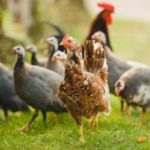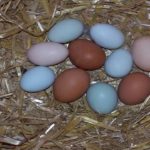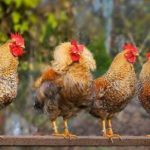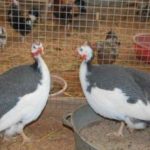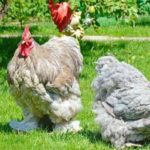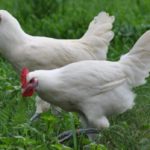Guinea fowl have not yet taken the main place in poultry farming. In Russia, chickens remain the predominant type of poultry. Let's look at how guinea fowl differ from chicken in appearance, characteristics, and productivity. Is it possible to keep birds of both species together, which of them is preferable for growing and breeding in the household.
What is the difference between chicken and guinea fowl
Birds can be distinguished by their appearance. Guinea fowl are slightly larger than chickens and have a rounded body with a short tail that hangs down. Females are slightly smaller than males.The standard plumage is gray with small frequent speckles. Chickens have more varied feather colors.
The guinea fowl's head is bare, with a keratinized crest and earrings on the sides. Chickens have a soft comb of different shapes, simple and curly; a rooster has a larger comb than a chicken. Roosters often have bushy tails, although not all breeds do. The neck of guinea fowl is longer and thinner than that of chickens. Birds of both species have short, wide-set legs and sharp claws on their toes. Both of them rake the ground in search of food and run quickly. Both species fly, but guinea fowl can fly higher than chickens, which usually fly no higher than 2 m.
There are also differences in the behavior of birds. Chickens were domesticated much earlier; they are accustomed to living close to people and animals, so they behave calmly and react adequately to agricultural machinery. Guinea fowl are more timid, afraid of noise and sudden movements. They do not have a developed maternal instinct and rarely hatch chicks themselves. Chickens are preferable in this regard - they can hatch chicks, not only their own, but also birds of other species.
Differences between birds' eggs
Female guinea fowl do not lay eggs all year round, like hens, but in warm weather - from March to October. Females do not lay eggs every day. It is considered a good result if you can get 100 eggs per season from one hen. Compared to chicken eggs, guinea fowl eggs are smaller and weigh 43-50 g. They have a different shape - the base is wide, the sharp end is narrower than chicken eggs.Thanks to this shape and thick shell, guinea fowl eggs are stronger than those of chickens and are not so easy to break.
The shell is rough, matte, in different shades of brown and yellow, with dark specks. The yolk is from pale yellow to dark orange, in this respect it is no different from chicken. Protein is more viscous because it contains less liquid. It has bactericidal properties, eggs do not spoil for a long time, and can be stored in the refrigerator for a year. This is explained by the fact that the shell contains few pores. However, it is undesirable to store it for so long; the eggs dry out and become tasteless.
Guinea fowl eggs have less fat and cholesterol and 4 times more carotene. They do not cause allergies and are recommended for use by children, pregnant women, the sick and the elderly.
Is it possible to keep guinea fowl and chickens together?
Poultry farmers often house guinea fowl in the same poultry house with chickens. Keeping both species together is acceptable if the birds are kept together from an early age. They do not have any special differences in nutrition and maintenance, but vaccination is necessary to protect the livestock from infectious diseases. Disadvantages of general housing - guinea fowl can destroy chicken nests, and hens do the same.
Larger birds may push smaller birds away from feeders and waterers, which can cause them to become malnourished. Guinea fowl are shy and noisy and can frighten chickens.
Which bird is better
Both types of birds have advantages and disadvantages. Both are well suited for home breeding; the choice depends on the goals that the poultry farmer sets for himself. But beginners are advised to start with raising chickens, as a less demanding bird.Chickens are cheaper, birds can be kept in numbers of just a few birds, while representatives of the guinea fowl family must live in a flock of 20 or more. Caring for chickens is easier, as is selling chicken meat and eggs. Keeping chickens is familiar to poultry farmers, so you can consult with colleagues on any questions that arise.
Experienced poultry farmers can safely raise guinea fowl. Their meat and eggs are more expensive due to the fact that they are not as accessible as chicken. Guinea fowl and chickens have differences in appearance and productivity. To choose which bird to raise, you should pay attention to the advantages and disadvantages of each species and take into account the purpose for which the bird is intended to be raised.



